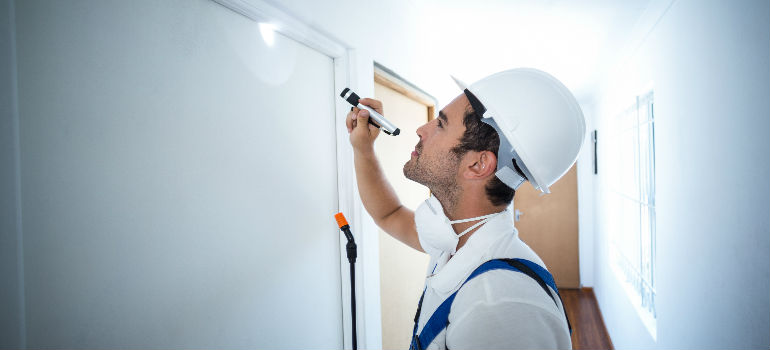
Dealing with pests in your house or company can cause a serious problem. From bedbugs interfering with your sleep to rats roaming your attic, these unwelcome visitors may rapidly make the premises feel everything but comfortable. Fortunately, all three methods of pest control – chemical, physical, and biological – can help you regain power.
From the fast and dependable power of chemical solutions to the environmentally friendly and non-toxic benefits of physical and biological approaches, we will dissect every method. Whether you have to handle a tiny problem or a full-fledged infestation, there is a solution that will fit you exactly.
Table of Contents
Chemical pest control
The most effective and widely used type of pest control is the use of chemical pesticides. Due to their reliability, there are several types of pesticides available to tackle rodent and insect infestations. Regardless of which type of pesticide is being used, it is always important to read and follow the instructions carefully since most of them are highly toxic.
Types of chemical pest control methods
Poison bait
Using poison bait is a popular and highly effective method of pest control and there are many pest-specific poisons to choose from. Pest control poison normally comes in one of two states. The first is in the form of granules and the second is a gel or jelly. Regardless of the type, poisoned bait is placed in areas that show signs of pest activity and will either be eaten directly or carried back to the nest.
If you have young children or pets, make sure that they cannot access any area where the poison is in use. Some commercial poisons can lead to serious health issues if ingested.
Insecticides
As the name suggests, insecticides are chemical products designed to kill insects, such as ants, cockroaches, and flies. Most commercially available insecticides are either spray- or granule-based and, while both will kill insects, they each have a particular area of expertise.
- Granulated insecticides are excellent for dealing with pests, such as ants and any other pests that build nests in hard-to-reach areas or actively scavenge for food. The granules are mistaken as food and are carried back into the nest, or are just eaten directly. The poison is usually fast-acting, so most insects die shortly after ingesting it.
- Sprays are best used against flying pests and biting pests such as fleas. Most insects will die within minutes of coming into contact with an insecticide spray, but some stubborn bugs may make you spray the area multiple times before giving up.
Rodenticides
Rodenticides are a highly lethal type of pesticide, more commonly known as rat poison. They are much stronger than the other pesticides due to the caution that rodents show when they encounter a suspicious food source. Due to this need for increased lethality, rodenticides are effective against all mammals when ingested. This includes rat control, cats, dogs, and other scavengers.
Since rat poison is so toxic and poses a threat to other animals, a lot of companies now prefer to use a baited trap box, rather than poison pellets. As with insecticides, you should always read and follow the instructions given by the manufacturer to keep your pets and children safe.
Check also:
Fogging
Fogging pest control is another alternative against adult flying insects such as mosquitoes, flies, moths or flying ants. This method is applied by a special ULV fogging machine through the infested areas. It’s called ULV(ultra-low volume), as it spreads a very small amount of insecticides. The advantage of the fogging pest control method is that it’s considered to be environmentally friendly, it’s odourless and doesn’t leave any residues that are difficult to clean.
Advantages and disadvantages of chemical pest control
- Advantages:
- – Pesticides are relatively inexpensive;
- – Chemical methods are often more reliable;
- – Chemical pest control products are easy to use;
- – They are fast-acting.
- Disadvantages:
- – Insects can develop a natural resistance to chemical pesticides over time;
- – Using pesticides can leave residue on plants, which can cause health issues;
- – They are highly toxic and can cause severe health issues if ingested;
- – Groundwater may become contaminated through the heavy use of pesticides.
Chemical pest control is a powerful tool in pest management but should always be used responsibly. Professional services ensure safe and effective application, minimising risks while maximising results.
Are you dealing with a pest infestation?
You don't have to be alone in the battle against pests. Hire a professional pest expert!
Call usPhysical pest control
Physical pest control involves the direct removal or exclusion of pests using physical barriers, devices, or manual techniques. This method is highly effective for addressing immediate pest problems and is often favoured for its eco-friendly and non-toxic nature.
Common techniques in physical pest control
Traps
Using physical traps to control pests is possibly the most recognisable pest control measure. Traps range in complexity (from simple fly paper to more complex baited traps) and they are mostly used to deal with rodents. As with the previously mentioned methods, trap placement should be focused on areas that show signs of pest activity. One major downside to using traps is that you have to check them regularly in order to remove any creature that has been caught, as well as to replace or reset the used traps.
Barriers
Physical barriers are an important pest management method in the house, as they provide an effective, non-toxic alternative for infestation prevention. Sealing entry spots such as cracks and holes around windows, doors, and walls is critical. Caulk and steel wool can seal tiny gaps, whereas steel mesh or metal flashing is ideal for wider gaps. These materials are ideal for use in basements and around utility lines because they are rodent-proof and long-lasting.
Bird control is an important part of domestic pest control. Spike strips or bird netting can be quite successful at keeping birds from nesting on ledges, rooftops, or balconies. Additionally, enclosing attic vents and chimneys with fine mesh keeps birds out while retaining airflow.
Elimination of breeding grounds
When looking for a place to infest, pests prefer to hide in a place that provides food and a safe breeding ground. Eliminating one, or both, of these factors will greatly increase your chances of removing pests. The best way of getting rid of breeding grounds in your home is to keep your home clean, dry, and warm. Maintaining a hygienic home and regularly cleaning dark, damp areas will severely limit the housing options for pests in your home.
Heat treatment
A chemical-free option that has been gaining popularity in the field of pest control. This method is used to deal with infestations caused by fleas, bed bugs, and other insects. During a heat treatment service, the infested area will be gradually heated to a temperature of 55-60°C. The rising temperature will eliminate the creepy crawlies at every stage of development (eggs, larvae, and adults). This is a great option if you have children or pets and are not keen on the idea of scattering poison throughout your home.
If you have noticed signs of pest activity or a developing infestation in your home, contact us to receive a quote from our Fantastic pest control experts.
Check also:
Advantages and disadvantages of physical pest control
- Advantages:
- Environmentally friendly, as it avoids the use of chemicals.
- Immediate results, especially for small infestations.
- Low risk to human health and pets when used correctly.
- Disadvantages:
- Labour-intensive and time-consuming for large-scale problems.
- Requires regular monitoring and maintenance to ensure effectiveness.
- Limited scope for preventing future infestations without additional measures.
Why Is physical pest control preferable to chemical poisons?
Physical pest control is often advised over chemical treatments due to its safety and environmental benefits. Unlike chemical poisons, which can endanger humans and pets and pollute the environment, physical control methods offer a non-toxic and quick answer.
For example, utilising traps and barriers can successfully manage pests without introducing toxic compounds into your house or yard. This method is especially useful in houses with children or pets, where reducing chemical exposure is a priority.
Physical pest control is a critical component of integrated pest management systems. It establishes a firm foundation for pest control without introducing potentially hazardous compounds into the environment. However, for large or repeated infestations, a combination of this treatment and chemical or biological approaches may be required.
Are you dealing with a pest infestation?
You don't have to be alone in the battle against pests. Hire a professional pest expert!
Call usBiological pest control
Biological control methods can also be seen as natural solutions as they do not rely on the use of pesticides or other chemicals. Biological pest control measures take advantage of the hierarchy within nature. This can be as simple as introducing the natural predator of a particular type of pest into your environment.
Techniques in biological pest control
Natural predators
This method of pest control is by no means modern. People have been using natural predators to control pest populations since the fourth century B.C. The fact that it is still in use shows how effective this method can be.
This tactic is most commonly used by gardeners seeking to control a pest population without the use of chemicals. One of the most popular applications of this method is the use of ladybugs to control, or remove, aphid infestations. However, introducing large numbers of foreign species to an area can have the opposite effect as well.
The best example of this is the giant cane toad in Australia. This species of toad was introduced to the country in order to reduce the population of cane beetles which were destroying crops. The toads did not reduce the beetle population as expected. Instead, they bred uncontrollably and have become a major ecological issue in their own right.
Microorganisms
Another popular natural pest control method used by gardeners is the use of beneficial microorganisms on plants. Unlike the use of natural predators, using microorganisms to control pests is a preemptive method. When a helpful microorganism is in a symbiotic relationship with a plant, it will actively protect the plant by deterring pests and destroying harmful bacteria and fungi.
Advantages and disadvantages of biological pest control
- Advantages:
- Environmentally sustainable and chemical-free.
- Reduces long-term pest resistance compared to chemical methods.
- Minimal risk to non-target species, including humans and pets.
- Disadvantages:
- Slower results compared to chemical methods.
- Effectiveness may depend on environmental conditions.
- Requires expertise to identify and introduce the right biological agents.
Biological pest control is an essential component of sustainable pest management, providing an effective and environmentally friendly alternative to conventional techniques. This method is particularly useful in agricultural and sensitive areas as it promotes ecological balance.
How to choose the right pest control method
Choosing the best pest control strategy depends on a variety of criteria. A well-informed decision can save time and resources while ensuring that the problem is properly handled.
- Type of pest – Identify the pest species to decide the best control approach. For example, biological pest control is frequently preferable for agricultural pests, although chemical treatments may be more efficient for the rapid removal of severe infestations.
- Severity of infestation – Physical measures such as traps or barriers are frequently sufficient to solve small-scale problems. Larger infestations may necessitate chemical treatments, such as fumigation or fogging, to guarantee thorough coverage.
- Safety and environmental impact – Physical pest treatment is preferable to chemical poisons since it is non-toxic, particularly in homes with children or pets. Assess the environmental impact of the chosen method, especially for outdoor or agricultural uses.
- Cost and feasibility – Consider the expense of professional services vs. DIY options. Certain procedures, such as heat treatments or fumigation, may necessitate specific equipment and knowledge.
Integrated Pest Management (IPM)
Integrated Pest Management (IPM) involves many strategies to achieve long-term, sustainable pest control. For example, IPM may include physical barriers, biological agents, and chemical treatments in an effective plan adapted to the pest and environment. This technique reduces dependency on toxic chemicals while increasing effectiveness.
The appropriate pest management strategy strikes a balance between effectiveness, safety, and environmental responsibility. Consulting with experienced pest control services can provide specialised answers to your individual needs, whether it is fumigation, rat control, or a combination of measures.
Takeaways
- The three methods of pest control are broadly divided into physical, chemical, and biological approaches, each having its own applications and benefits.
- Physical pest control is best suited for small-scale and environmentally friendly solutions, whereas chemical pest control shines in large-scale or severe infestations.
- Biological pest management is a sustainable option, especially useful in agricultural contexts.
- The appropriate approach is determined by insect type, infestation severity, and environmental concerns.
- Professional pest control services offer specialised, effective solutions that guarantee safety and long-term results.
Image source: wavebreakmedia/shutterstock.com
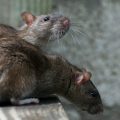
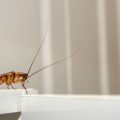


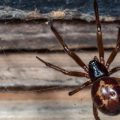
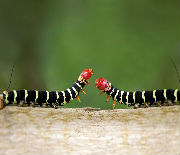
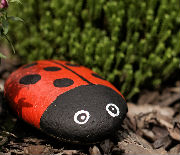
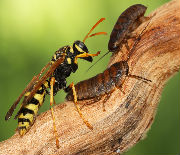
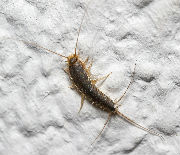
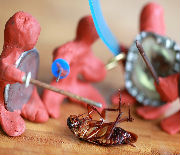
The leaf-footed bug belongs to the order Hemiptera, the true bug family
I have had some success with Air Sense brand Vanilla room spray. It seems to keep insects away for a long time. However I decided to stop using it because I found out it has essential oils in it and they’re dangerous for my cats. They haven’t been ill from it, but I don’t want to chance it if I use it long term. A bonus is that it has a great fragrance